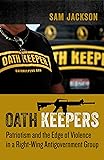Oath Keepers
Published:
Oath Keepers

Metadata
- Author: Sam Jackson
- Full Title: Oath Keepers
- Category: #books
Highlights
- For years, the group has warned that the federal government is preparing to attack its own citizens, and it urges Americans to prepare for that conflict by gathering supplies and engaging in paramilitary training. It has also warned that the global economy will soon collapse, and it urges Americans to prepare by stockpiling goods and retreating into small self-sufficient, community-based economies. (Location 101)
- This project uses a sociological approach called framing analysis to examine Oath Keepers discourse about politics, history, and forms of political behavior. In (Location 124)
- This book does not use interviews with individual members of the group as data. My interest is in how the group portrays itself to a wide public, not how the group’s members talk in one-on-one conversations with a single academic. Additionally, as this analysis does not investigate whether the group’s members believe everything they say or whether they agree with the group’s talking points or actions, interviews would not provide me any additional analytical leverage. (Location 140)
- With Trump’s victory, the relationship Oath Keepers had to government changed dramatically. Now, it had a man in the Oval Office. The group had real hopes that Trump would pursue policies that aligned with its views on immigration, public land, economics, and more. For the first time in years, Oath Keepers could imagine government as a force for good. At the same time, a new enemy emerged to take government’s place: Americans who oppose Trump, his policies, and his presidency. “Antifa”—short for “antifascist” and commonly used to describe leftist activists who engage in a range of street action—has become the new boogeyman for Oath Keepers. Members of Oath Keepers (along with others on the far right) see these activists as the real fascists, as people who will use violence and intimidation to prevent other Americans from exercising First Amendment rights to speech and assembly. According to Oath Keepers, today government is not the greatest threat to Americans—other Americans are. (Location 151)
- political extremism, that is, activity that seeks to change fundamental features of the American political system. (Location 180)
- Put most simply—perhaps reductively—right-wing politics sees its ideal political community somewhere in the past (or sees its ideal community as a new embodiment of past political values), whereas left-wing politics sees its ideal political community somewhere in the future. Oath Keepers, like other far-right actors, seeks to restore an imagined past golden age. (Location 202)
- I have argued elsewhere for a non-normative scholarly understanding of extremism that is deeply contextual and facilitates comparison among different actors, actions, and ideas. In short, I define political extremism as “purposeful disruptive political behavior” that “aims to change fundamental features of a particular political system.”7 (Location 219)
- right-wing extremism is activity that, in reaction to perceptions of negative change, aims to revert fundamental features of the political system to some imagined (though not necessarily imaginary) past state.10 (Location 234)
- Islamist extremism in the United States is not right-wing extremism, as it does not seek to restore a lost state where political Islam was dominant in this country. But Islamist extremism in other contexts, perhaps in Turkey, Iran, or Egypt, does meet the definition of right-wing extremism, in that such extremists hope to restore the historical political power of Islam in their country. (Location 249)
- Contemporary right-wing extremism in the United States contains three primary categories: racist extremism, nativist extremism, and antigovernment extremism (see figure 1.1 (Location 252)
- Antigovernment extremism contains two main subcategories: sovereign citizens and the patriot/militia movement. (Location 306)
- In 2014, researchers affiliated with the National Consortium for the Study of Terrorism and Responses to Terrorism (START) surveyed law enforcement officers from across the country, asking whether officers viewed different types of extremists as a “serious terrorist threat.” The respondents believed that sovereign citizens posed a greater threat than “Islamic Extremists/Jihadists,” neo-Nazis, or any other category of extremist actor.28 (Location 314)
- The patriot/militia movement believes that the federal government poses the greatest threat to the life, liberty, and happiness of Americans and that all true Americans should prepare themselves for an inevitable conflict with the government. (Location 328)
- Perhaps the primary difference between racist right-wing extremism and nativist right-wing extremism lies in whether the extremists think that outsiders can “convert” to insider status. (Location 337)
- many of the ideas previously articulated by Posse Comitatus adherents are promoted by antigovernment extremists (though often without the explicit racism), and some scholars argue that certain elements of antigovernment extremism developed directly out of Posse. (Location 375)
- Besides inheriting core ideas from explicitly racist predecessors, antigovernment extremists of various flavors engage in activities that suggest affinity with contemporary racist extremists. For example, throughout 2016 and 2017, members of antigovernment militia groups acted as de facto security for the so-called alt-right.47 These militia members stressed that they undertook their “security operations” to defend the rights of white supremacists to assemble peaceably and express their constitutionally protected political beliefs—but not to support those beliefs. But they have not undertaken any similar activity to protect the First Amendment rights of those widely understood as left-leaning or liberal. (Location 389)
public: true
title: Oath Keepers longtitle: Oath Keepers author: Sam Jackson url: , source: kindle last_highlight: 2021-02-14 type: books tags:
Oath Keepers

Metadata
- Author: Sam Jackson
- Full Title: Oath Keepers
- Category: #books
Highlights
- For years, the group has warned that the federal government is preparing to attack its own citizens, and it urges Americans to prepare for that conflict by gathering supplies and engaging in paramilitary training. It has also warned that the global economy will soon collapse, and it urges Americans to prepare by stockpiling goods and retreating into small self-sufficient, community-based economies. (Location 101)
- This project uses a sociological approach called framing analysis to examine Oath Keepers discourse about politics, history, and forms of political behavior. In (Location 124)
- This book does not use interviews with individual members of the group as data. My interest is in how the group portrays itself to a wide public, not how the group’s members talk in one-on-one conversations with a single academic. Additionally, as this analysis does not investigate whether the group’s members believe everything they say or whether they agree with the group’s talking points or actions, interviews would not provide me any additional analytical leverage. (Location 140)
- With Trump’s victory, the relationship Oath Keepers had to government changed dramatically. Now, it had a man in the Oval Office. The group had real hopes that Trump would pursue policies that aligned with its views on immigration, public land, economics, and more. For the first time in years, Oath Keepers could imagine government as a force for good. At the same time, a new enemy emerged to take government’s place: Americans who oppose Trump, his policies, and his presidency. “Antifa”—short for “antifascist” and commonly used to describe leftist activists who engage in a range of street action—has become the new boogeyman for Oath Keepers. Members of Oath Keepers (along with others on the far right) see these activists as the real fascists, as people who will use violence and intimidation to prevent other Americans from exercising First Amendment rights to speech and assembly. According to Oath Keepers, today government is not the greatest threat to Americans—other Americans are. (Location 151)
- political extremism, that is, activity that seeks to change fundamental features of the American political system. (Location 180)
- Put most simply—perhaps reductively—right-wing politics sees its ideal political community somewhere in the past (or sees its ideal community as a new embodiment of past political values), whereas left-wing politics sees its ideal political community somewhere in the future. Oath Keepers, like other far-right actors, seeks to restore an imagined past golden age. (Location 202)
- I have argued elsewhere for a non-normative scholarly understanding of extremism that is deeply contextual and facilitates comparison among different actors, actions, and ideas. In short, I define political extremism as “purposeful disruptive political behavior” that “aims to change fundamental features of a particular political system.”7 (Location 219)
- right-wing extremism is activity that, in reaction to perceptions of negative change, aims to revert fundamental features of the political system to some imagined (though not necessarily imaginary) past state.10 (Location 234)
- Islamist extremism in the United States is not right-wing extremism, as it does not seek to restore a lost state where political Islam was dominant in this country. But Islamist extremism in other contexts, perhaps in Turkey, Iran, or Egypt, does meet the definition of right-wing extremism, in that such extremists hope to restore the historical political power of Islam in their country. (Location 249)
- Contemporary right-wing extremism in the United States contains three primary categories: racist extremism, nativist extremism, and antigovernment extremism (see figure 1.1 (Location 252)
- Antigovernment extremism contains two main subcategories: sovereign citizens and the patriot/militia movement. (Location 306)
- In 2014, researchers affiliated with the National Consortium for the Study of Terrorism and Responses to Terrorism (START) surveyed law enforcement officers from across the country, asking whether officers viewed different types of extremists as a “serious terrorist threat.” The respondents believed that sovereign citizens posed a greater threat than “Islamic Extremists/Jihadists,” neo-Nazis, or any other category of extremist actor.28 (Location 314)
- The patriot/militia movement believes that the federal government poses the greatest threat to the life, liberty, and happiness of Americans and that all true Americans should prepare themselves for an inevitable conflict with the government. (Location 328)
- Perhaps the primary difference between racist right-wing extremism and nativist right-wing extremism lies in whether the extremists think that outsiders can “convert” to insider status. (Location 337)
- many of the ideas previously articulated by Posse Comitatus adherents are promoted by antigovernment extremists (though often without the explicit racism), and some scholars argue that certain elements of antigovernment extremism developed directly out of Posse. (Location 375)
- Besides inheriting core ideas from explicitly racist predecessors, antigovernment extremists of various flavors engage in activities that suggest affinity with contemporary racist extremists. For example, throughout 2016 and 2017, members of antigovernment militia groups acted as de facto security for the so-called alt-right.47 These militia members stressed that they undertook their “security operations” to defend the rights of white supremacists to assemble peaceably and express their constitutionally protected political beliefs—but not to support those beliefs. But they have not undertaken any similar activity to protect the First Amendment rights of those widely understood as left-leaning or liberal. (Location 389)